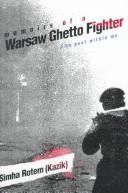| Listing 1 - 4 of 4 |
Sort by
|

ISBN: 0300057970 Year: 1994 Publisher: New Haven London Yale University Press
Abstract | Keywords | Export | Availability | Bookmark
 Loading...
Loading...Choose an application
- Reference Manager
- EndNote
- RefWorks (Direct export to RefWorks)
Book
ISBN: 0631178023 Year: 1991 Volume: vol *2 Publisher: Oxford, UK Cambridge, Mass., USA B. Blackwell
Abstract | Keywords | Export | Availability | Bookmark
 Loading...
Loading...Choose an application
- Reference Manager
- EndNote
- RefWorks (Direct export to RefWorks)
Jews --- -Jews --- -Hebrews --- Israelites --- Jewish people --- Jewry --- Judaic people --- Judaists --- Ethnology --- Religious adherents --- Semites --- Judaism --- Emancipation --- -History --- -Poland --- -Ethnic relations --- -Emancipation --- Hebrews --- History --- Poland --- Ethnic relations. --- 19th century --- Ethnic relations --- Jews - Poland - History - 19th century. --- Jews - Poland - Emancipation. --- Poland - Ethnic relations.
Book
ISBN: 9783631623657 3631623658 1306143918 3653036755 Year: 2013 Volume: 5 Publisher: Bern Peter Lang International Academic Publishing Group
Abstract | Keywords | Export | Availability | Bookmark
 Loading...
Loading...Choose an application
- Reference Manager
- EndNote
- RefWorks (Direct export to RefWorks)
The book aims to reconstruct and analyze the disputes over the Polish-Jewish past and memory in public debates in Poland between 1985 and 2012, from the discussions about Claude Lanzmann's Shoah, Jan Blonski's essay The Poor Poles Look at the Ghetto, Jan Tomasz Gross' books Neighbours, Fear and Golden Harvest, to the controversies surrounding the premiere of Wladyslaw Pasikowski's The Aftermath. The analysis includes the course and dynamics of the debates and, most importantly, the panorama of opinions revealed in the process. It embraces the debates held across the entire spectrum of the nati
Jews --- Holocaust, Jewish (1939-1945) --- Public opinion --- Juifs --- Holocauste, 1939-1945 --- Opinion publique --- History --- Crimes against --- Histoire --- Crimes contre les --- Poland --- Pologne --- Ethnic relations. --- Relations interethniques --- Ethnic relations --- Jews - Poland - History - 20th century --- Holocaust, Jewish (1939-1945) - Poland --- Jews - Crimes against - Poland --- Public opinion - Poland --- Poland - Ethnic relations --- Anti-Semitism --- Auschwitz --- Birkenau --- collective forgetting --- Collective memory --- Debates --- Forecki --- Holocaust --- Jedwabne --- Memory --- Polish --- Public --- Public discourse --- Reconstructing
Book
ISBN: 3531192256 9786613708526 3531192264 1280798130 Year: 2012 Publisher: Wiesbaden : Springer VS,
Abstract | Keywords | Export | Availability | Bookmark
 Loading...
Loading...Choose an application
- Reference Manager
- EndNote
- RefWorks (Direct export to RefWorks)
This book contributes to the theoretical and methodological discussion about how the diverging experiences of generations and their historical memories play a role in the process of national identity formation. Drawing from narratives gathered within the Ukrainian minority in northern Poland and centered on the collective trauma of Action Vistula, where in 1947 about 140,000 Ukrainians were resettled from south-eastern Poland and relocated to the north-western areas, this study shows that three generations vary considerably with regard to their understandings of home, integration, history and religion. Thus, generational differences are an essential element in the analysis and understanding of social and political change. The findings of this study provide a contribution to debates about the process based nature of national identity, the role of trauma in creating generational consciousness and how generations should be conceptualized.
Minorities -- Poland -- History. --- Nationalism -- Poland. --- Poland -- Ethnic relations -- History. --- Poland -- Social conditions -- History. --- Ukrainians -- Poland -- History. --- Social Sciences --- Social Sciences - General --- Ukrainians --- Nationalism --- Minorities --- History. --- Poland --- Ethnic relations. --- Social conditions. --- Ethnic minorities --- Foreign population --- Minority groups --- Social sciences. --- Social Sciences. --- Social Sciences, general. --- Persons --- Assimilation (Sociology) --- Discrimination --- Ethnic relations --- Majorities --- Plebiscite --- Race relations --- Segregation --- Ethnology --- Slavs, Eastern --- Ruthenians --- Behavioral sciences --- Human sciences --- Sciences, Social --- Social science --- Social studies --- Civilization
| Listing 1 - 4 of 4 |
Sort by
|

 Search
Search Feedback
Feedback About UniCat
About UniCat  Help
Help News
News